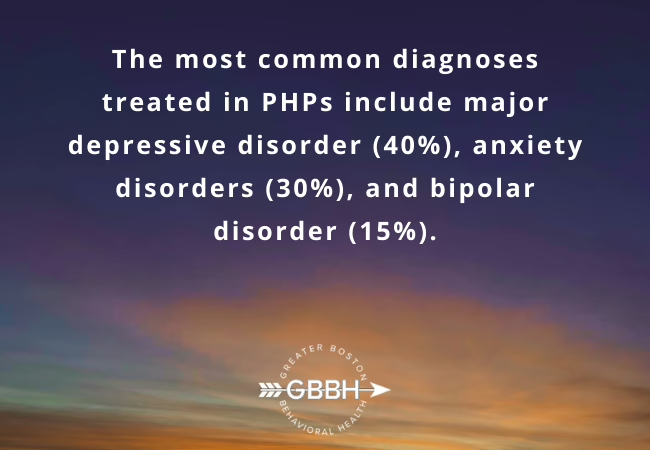Mental health and addiction recovery are deeply personal journeys—and finding the right level of care is one of the most important decisions you can make. For individuals who need more than traditional outpatient therapy but may not require full-time hospitalization, two primary treatment options come into focus: Partial Hospitalization Programs (PHP) and Inpatient Rehab.
At Greater Boston Behavioral Health, we understand that no two individuals experience mental health struggles the same way. That’s why we offer personalized, evidence-based care through our Partial Hospitalization Program in Massachusetts, and coordinate with trusted providers for Inpatient Treatment Programs in Massachusetts.
In this in-depth guide, we’ll help you compare both options, break down their differences, and explore how to decide which approach will offer the most healing and long-term success for you or your loved one.
What Is a Partial Hospitalization Program (PHP)?
A Partial Hospitalization Program (PHP) is a structured and intensive outpatient mental health treatment option. It provides comprehensive therapy, psychiatric care, and skill-building during the day—typically 5 to 6 hours a day, five days per week—while allowing clients to return home in the evenings.
Unlike inpatient rehab, PHP does not require overnight stays. This allows individuals to maintain a sense of autonomy and connection to home life while still receiving a high level of care.
At our mental health treatment center in Massachusetts, our PHP clients engage in:
- Group therapy sessions focused on CBT, DBT, and trauma-informed care
- Individual therapy sessions to address personal issues and trauma
- Medication management and psychiatric monitoring
- Psychoeducation workshops on coping skills, relapse prevention, and mental wellness
- Specialty programming, including Anger Management Therapy in Massachusetts
- Family involvement and aftercare planning
PHP is ideal for individuals who are stable enough to remain in their home environment but need more structure than weekly therapy provides.
What Is Inpatient Rehab?
Inpatient rehab, also known as residential treatment, involves staying at a treatment facility 24/7 for a designated period of time. It is designed for individuals experiencing acute psychiatric distress, significant functional impairment, or those who pose a risk to themselves or others.
Inpatient care may be medically necessary for individuals dealing with:
- Suicidal thoughts or self-harming behaviors
- Psychosis or hallucinations
- Severe substance use requiring medical detox
- Debilitating depression or anxiety
- Unstable or unsafe home environments
- Failed attempts in lower levels of care
While enrolled in an Inpatient Treatment Program in Massachusetts, individuals receive around-the-clock supervision, medical support, therapy, and structure.
PHP vs. Inpatient Rehab: Key Differences
| Feature | Partial Hospitalization Program (PHP) | Inpatient Rehab |
|---|---|---|
| Care Level | High (Day Treatment) | Highest (24/7 Monitoring) |
| Setting | Live at home | Live at facility |
| Schedule | 5–6 hours/day, 5 days/week | 24/7 care, structured daily schedule |
| Overnight Stay | No | Yes |
| Freedom | High flexibility | Restricted freedom |
| Ideal For | Moderate to severe symptoms; stable living environment | Severe crisis; high-risk individuals |
| Cost | Lower | Higher (room, board, medical care) |
| Transition Plan | Often followed by IOP or outpatient therapy | May step down into PHP or IOP |
Who Benefits Most from a Partial Hospitalization Program?
You may be a great candidate for PHP if:
- You’ve recently completed inpatient treatment and need step-down support
- You need more than weekly therapy but not 24/7 care
- Your home environment is safe and stable
- You are experiencing persistent mental health symptoms like depression, anxiety, or PTSD
- You are managing co-occurring disorders (mental health + substance use)
- You struggle with emotional regulation and need anger management therapy in Massachusetts
- You want a flexible treatment plan that allows you to live at home
PHP offers intensive clinical support without completely disrupting your personal or professional life. It’s also a cost-effective alternative to inpatient treatment.
Who Benefits Most from Inpatient Rehab?
Inpatient rehab is ideal for individuals experiencing a mental health crisis that can’t be safely managed in a less structured environment. You may benefit from inpatient care if:
- You are at risk of harming yourself or others
- You’ve experienced a recent psychiatric hospitalization or suicide attempt
- You are unable to care for yourself or function daily
- You need 24/7 monitoring for safety or detox
- You’ve tried PHP or outpatient therapy but relapsed
- Your home environment is unstable or not conducive to recovery
Inpatient Treatment Programs in Massachusetts provide full-time care in a safe, supportive setting where clients can stabilize before transitioning to lower levels of care like PHP or IOP.
What Happens After PHP or Inpatient Rehab?
Recovery doesn’t stop when a treatment program ends—sustained progress requires a clear path forward. At Greater Boston Behavioral Health, we guide each client through personalized aftercare planning.
After PHP:
- Step-down into our Intensive Outpatient Program in Massachusetts
- Transition to outpatient therapy
- Continue medication management with our providers
- Join alumni support groups or ongoing skill-based groups
After Inpatient:
- Step down into Partial Hospitalization Program in Massachusetts
- Followed by IOP and outpatient therapy
- Access community resources and psychiatric follow-up
Our goal is to ensure long-term stability through a full continuum of care—mental health programs in Massachusetts that grow with your recovery.
Key Benefits of PHP at Greater Boston Behavioral Health
Our Mental Health Programs in Massachusetts are designed to empower individuals while providing real-world tools for long-term recovery. When you enroll in our PHP, you gain:
Structured Daily Schedule
Clients receive comprehensive care, including:
-
Group therapy (CBT, DBT, trauma-informed)
-
Individual counseling
-
Medication management
-
Anger management therapy in Massachusetts
-
Psychoeducation
-
Relapse prevention
-
Life-skills development
Flexible, Home-Based Recovery
Clients return to their homes each evening, allowing them to:
-
Stay connected with family
-
Practice new skills in real life
-
Continue school or part-time work
-
Avoid the stigma and cost of full hospitalization
Continuum of Care
We offer seamless step-down services into our Intensive Outpatient Program in Massachusetts or outpatient care—ensuring long-term stability.
Choosing the Right Level of Care: 5 Questions to Ask
-
Am I in immediate danger to myself or others?
➤ If yes, inpatient treatment is the safest choice. -
Do I need 24/7 supervision or detox?
➤ If yes, opt for inpatient rehab. -
Can I safely live at home with support?
➤ If yes, PHP may be a good fit. -
Have I recently completed inpatient or residential care?
➤ PHP is ideal for step-down recovery. -
Am I looking for structure but also want flexibility?
➤ PHP offers balance between treatment and independence.
Still unsure? That’s okay. Our admissions team is here to help you determine the best path forward based on your individual situation.
Why Choose Greater Boston Behavioral Health?
At Greater Boston Behavioral Health, we’re proud to be a leading mental health treatment center in Massachusetts, offering compassionate, customized care at every level.
Here’s what sets us apart:
- Personalized treatment plans tailored to your diagnosis and life goals
- Dual diagnosis expertise for co-occurring mental health and substance use conditions
- Specialized services like Anger Management Therapy in Massachusetts
- A strong continuum of care, from inpatient referrals to PHP, IOP, and outpatient
- Licensed clinicians and psychiatric providers with years of experience
- A trauma-informed, inclusive, and stigma-free environment
Whether you need 24/7 inpatient rehab or a flexible, structured PHP, we’re here to walk with you every step of the way.
Start Your Recovery Journey Today
Choosing the right mental health program can feel daunting—but you don’t have to do it alone. Call Greater Boston Behavioral Health today at 888.278.0716 to speak with an admissions specialist. We’ll assess your needs, answer your questions, and help you find the right level of care—whether that’s our Partial Hospitalization Program in Massachusetts, a Residential Treatment Program, or our Intensive Outpatient Program.
FAQ on PHP vs. Inpatient Rehab
What is the main difference between PHP and inpatient rehab?
PHP allows individuals to receive intensive, structured care during the day while living at home. Inpatient rehab requires 24/7 residential care and supervision within a treatment facility.
Is a Partial Hospitalization Program as effective as inpatient treatment?
Yes—for individuals who are stable and have a supportive home environment, PHP can be just as effective as inpatient rehab, especially when followed by an appropriate step-down plan like IOP or outpatient therapy.
How do I know if I need inpatient treatment instead of PHP?
If you’re in acute crisis, at risk of self-harm, need medical detox, or are unable to function safely at home, inpatient care is the safer and more intensive option.
Can PHP help with co-occurring mental health and substance use disorders?
Absolutely. At Greater Boston Behavioral Health, our Partial Hospitalization Program in Massachusetts includes dual diagnosis treatment and medication management.
What conditions are treated in PHP vs. inpatient rehab?
Both treat a wide range of conditions, including depression, anxiety, PTSD, and bipolar disorder. Inpatient rehab is best for crisis stabilization, while PHP is better for structured daily care outside of a residential setting.
Is anger management available in PHP?
Yes. Our PHP includes Anger Management Therapy in Massachusetts to help individuals learn emotional regulation and healthier communication.
What happens after I complete PHP or inpatient care?
We provide step-down support into our Intensive Outpatient Program in Massachusetts or outpatient therapy. Aftercare planning is part of every discharge process.


